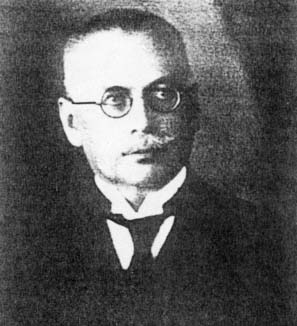<Back to Index>
- Statistician Ladislaus Josephovich Bortkiewicz, 1868
- Painter Emil Nolde, 1867
- Major General of the Continental Army Nathanael Greene, 1742
PAGE SPONSOR

Ladislaus Josephovich Bortkiewicz (Russian: Владислав Иосифович Борткевич, Polish: Władysław Bortkiewicz, German: Ladislaus von Bortkewitsch, Czech: L. Bortkevič or Czech: L. Bortkěvič), August 7, 1868 – July 15, 1931) was a Russian economist and statistician of Polish descent, who lived most of his professional life in Germany, where he taught at Strassburg University (Privatdozent, 1895 – 1897) and Berlin University (1901 – 1931). He was of minor nobility: for his earlier publication he used the German style "von" as Ladislaus von Bortkewitsch, for his later publications he changed it slightly to Ladislaus von Bortkiewicz.
Bortkiewicz was born in Saint Petersburg, Imperial Russia (today Russia) where he graduated from the Law Faculty in 1890.
In 1898 he published a book about the Poisson distribution, titled The Law of Small Numbers. In this book he first noted that events with low frequency in a large population follow a Poisson distribution even when the probabilities of the events varied. It was that book that made the Prussian horse-kick data famous. The data give the number of soldiers killed by being kicked by a horse each year in each of 14 cavalry corps over a 20-year period. Bortkiewicz showed that those numbers follow a Poisson distribution. The book also examined data on child suicides. Some historians of mathematics have even argued that the Poisson distribution should have been named the "Bortkiewicz distribution."
Bortkiewicz attempted to predict how many pieces of artillery would overheat in an intensive battle. He failed in this because of his limited knowledge of thermodynamics and metallic composition of cannons.
In political economy, Bortkiewicz is important for his analysis of Karl Marx's reproduction schema in the last two volumes of Capital. Bortkiewicz identified a transformation problem in Marx's work which, if proven, would profoundly undermine Marx's claim to have provided a consistent account of capitalist economics. This work provided the basis of major elaborations by Joseph Schumpeter and Paul Sweezy among others.
Bortkiewicz died in Berlin, Germany. His papers, including a voluminous correspondence file (some 1,000 letters 1876 – 1931), are deposited at Uppsala University in Sweden, except for his correspondence with Léon Walras which went into the collection of the Walras scholar William Jaffe in the USA.